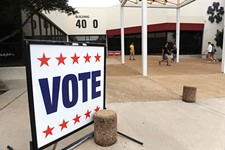Beside the Point
Happy Daze
By Wells Dunbar, Fri., May 5, 2006
Dozens of drivers clogged City Council chambers into the wee hours – we'll get to them later – but the true embarrassment of riches came at 11am: The city's "financial forecast" parted the clouds, shining cotton-candy sunbeams into 301 W. Second. "Cautiously optimistic" sunbeams, to be specific – as if there were any other type at city hall. Accounting for the clear skies, said Texas Perspectives economist John Hockenyos, are several influences: swelling sales and property taxes, steady employment growth, and 4.3% unemployment. However, Hockenyos noted several external factors that could have a dampening effect, including the unknown price tag of the proposed "Open Government Online" amendment, and uncertainties like fuel and public safety costs. (City Manager Toby Futrell reminded all present that public safety – police, fire, EMS – is on track to consume 77% of all departmental expenditures in 2007.) Rising gas prices, meanwhile, portend a proposed water and electric rate increase in the next five years.
But the emphasis was jubilation. "Things may get slightly better," said Hockenyos, "which is hard to imagine considering how relatively good things are right now."
The C'mon-Get-Happy affluenza, however, was not contagious. The brightness of Austin's finances hung over the Roy's Taxi/Yellow Cab discussion like a springtime haze, only an allergen to the dozens of hacks speaking against the transfer of Roy's permits (as the company is sold) to the Yellow behemoth. Several camps spoke: those opposed to Yellow expanding its empire, since the company charges its drivers $50 more a week ($270) than Roy's ($220); those jockeying to pick up some or all of Roy's 155 permits, in hopes of creating their own franchise (wannabes Longhorn Cab and Capitol City) or expanding their existing one (Austin Cab); and those advocating that the city sit on Roy's permits, claiming that keeping them off the market would be better for existing drivers.
Despite testimony firing the dais until 1am, council members said they can't, as Jennifer Kim put it, rob Roy of his "exit strategy" on the eve of his retirement. Proposals to transfer the permits to a separate entity are compromised since under his freshly renewed franchise, the permits are Roy's to do with as he sees fit. Betty Dunkerley eventually floated her own proposal, which passed on first reading: approve the transfer, let Yellow cover the cab conversion costs of Roy's drivers wanting to follow the permits, and send 20 permits Austin Cab's way for those who'd rather not sail Yellow. Additionally, 71 new permits borrowed against future growth, along with four from Yellow, would be set aside for a new franchise. (Any changes won't take place until 60 days after third and final reading – if it comes.) Speaking to the other big transportation item before council – revamping tow truck code – Will Wynn joked the hope was they'd "tow away some of the angry taxi cabs." Good luck to the mayor getting that ride from the condo this weekend.
Further jamming traffic was a presentation on the Green Water Treatment Plant proposals, during which Roy G. Guerrero Park finally disappeared from the rear-view. Council responded with a clear, decisive voice: We Need More Time – to examine the two privately owned tracts under consideration, and perennial contender Water Treatment Plant No. 4. Compounding the problem is the practical deadline of 2011: Failing to meet the timeline, said Water Utility director Chris Lippe, will unleash public health threats and douse firefighting resources.
Further Green talk isn't scheduled for this week, but of note to the Eastside is a resolution authorizing the closing of Holly Power Plant Units 3 and 4 (Item 19). Also up are the bond package's biggest cliffhangers (after central library funds held steady last week at $90 million): affordable housing and open space. The council is trying to shrink the overall package from $614 million to – by their most generous estimate – $530 million. Since $436.4 million is already spoken for, only $93.6 million remains for both affordable housing and open space. That's a far cry from the nearly $160 million originally proposed by the citizens' committee ($67.5 for housing, $92.3 million for land). Well, we can all hope Prop. 1 saves billions!
Got something to say on the subject? Send a letter to the editor.










